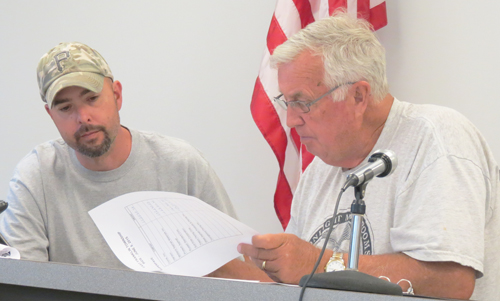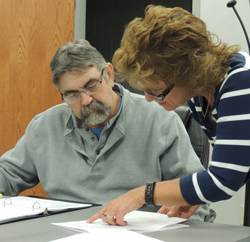
Township Roadmaster Ron Lithgow (left) recommended the purchase of some new equipment next year that is already in the budget. A new police cruiser is also in the plans (KP File Photo).
by Jonathan Weaver
East Franklin Township residents might not see a tax increase again next year.
The 2016 budget is once again ‘in the good,’ according to Township Secretary Debra Cornman and does not call for a tax increase.
Local residents currently pay six mills of taxes.
Cornman led a detailed line-by-line explanation of the six-page General Fund plan, as well as the State Fund and Sewage Fund, during a nearly-two hour budget workshop last night.
As has been at least the last three years, a deficit in the sewage fund will be paid off via the General Fund.
In 2015, a $13,750 deficit was paid off and in 2016, that number is expected to exceed $20,500 due to rising electric, chemical and equipment costs.
“We dropped the engineering fees, but the electric has gone up,” Cornman said.

Secretary/Treasurer Debra Cornman and Working Supervisor David Stewart analyze the tentative 2016 sewage budget at last night’s budget workshop. Sewage expenses are expected to rise next year due to increased chemical and electrical costs.
The three supervisors – including Working Supervisor David Stewart (the sewage operator at the Adrian, Cowansville, Tarrtown and Fox Hollow plants) hope to cut down on chemical costs with an ultraviolet disinfection system at the Cowansville plant.
But, the last effort to pay for it utilizing Community Development Block Grant funding failed after not enough residents re-submitted enough community surveys returned to qualify.
Supervisors expressed they are willing to go door-to-door again this coming year.
Stewart said he has even tried in-house ways to cut back on utilizing electric, but it doesn’t make a difference.
Even though the more-than 230 sewage customers pay enough to offset most of the $170,000 in regular expenses, it does not account for Stewart’s full-time or Secretary Carla Scholl’s wages.
2015’s actual revenue has exceeded projected figures by nearly $80,000 this year as well.
About $500,000 of 2015’s income came via real property taxes. Earned income tax and local service tax fees made that figure exceed $1 million.
More local tax revenue is expected in 2016.
A trio of businesses pays for liquor licenses.
Other than insurances, wages and new equipment, one of the largest single – and long-term – expenses is from the township building loan.
Cornman explained she is trying to pay off the new township building within 16 years and three months – February 2029 - so that there is no balloon payment in ‘Year 21’ of the 25-year building loan.
“I’ve been paying $3,000 extra on the principle – which makes that a $10,700 payment per month,” Cornman said. “If I see that the township is in trouble, I’ll drop that down.
“If we pay another five years, that balloon payment will probably be paid off.”
There is more than $1,350,000 still owed in the loan. There is an initial $6,400 principle cost per month.
Engineering projected expenses are less than half of last year’s expectations (and significantly since the $180,000 spent during 2013) and computer services projected expenditures were also cut by $2,000, but that extra funding was budgeted for an-increased building telephone maintenance agreement, repairs and the annual capital loan payment.
No wage increases were budgeted for, except for Police Sgt. William Evans’ .71 cent increase (a stipulation of his union contract). He and Officer Robert Gahagan are estimated to receive a combined-$85,000 in salary in 2016.
During January’s reorganization, Officer Gahagan, Roadmaster Ron Lithgow, Secretary/Treasurer Cornman, Assistant Secretary/Treasurer Scholl and part-time work crew members Norman Bennett and Dean Hepler all received at least a $1 raise per hour in 2015.
The 2016 funding plan also calls for a new police cruiser – paid for during the next three years – a new lawn mower – and continued funding toward the township fire department.
The township has about $2.28 million in loans in total – including another nearly-15 years in loans for the sewage treatment plants.
With no other budget workshops planned, supervisors will revisit the tentative budget at their November 23 regular meeting.

